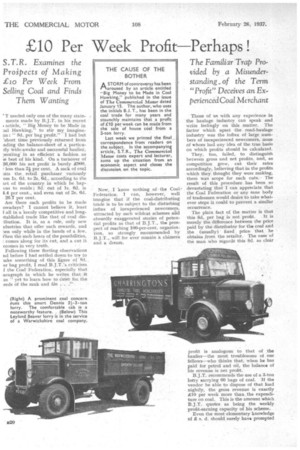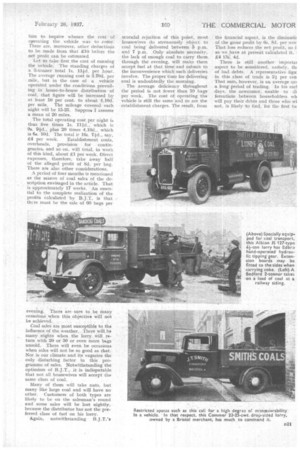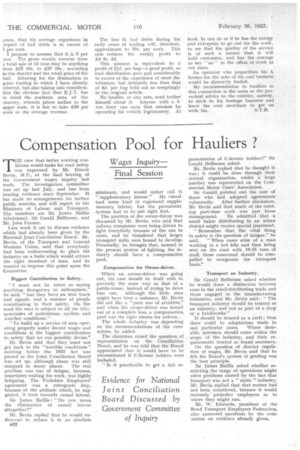£10 Per Week Profit—Perhaps !
Page 54

Page 55

Page 56

If you've noticed an error in this article please click here to report it so we can fix it.
S . T. R . Examines the Proipeets of Making Xi° Per Week From Selling Coal and Finds
Them Wanting
The Familiar Trap Provided by a Misunderstanding of the Term "Profit" Deceives an Experienced Coal Merchant T needed only one of the many statements made by B.J.T. in his recent . article, " Big Money to be Made in sal Hawking," to stir my imagineon "8d. per bag profit." I had but 'short time previously returned from ading the balance-sheet of a particurly wide-awake and successful haulier, ?erating in as efficient a fashion as le best of his kind. On a turnover of 36,000 his net profit is barely £000, less than 2i per cent. A sack of coal )Sts the retail purchaser variously om 1s. 6d. to 2s. 6d., according to the art of the country in which he hapens to reside ; 8c1. out of is. 6d. is 1.4 per cent., and even out of 2s. 6d. 26.7 per cent.
Are there such profits to be made owa.days? I cannot believe it, least f all in a keenly competitive and longttablished trade like that of coal dis-ibution. It is, as a rule, only new idustries that offer such rewards, and len only while in the hands of a few. Then the mob hears of the possibilities, : comes along for its cut, and a cut it ecomes in very truth.
Following these fleeting observations nd before I had settled down to try to sake something of this figure of 8d. , er bag profit, I read B.J.T.'s criticism I the Coal Federation, especially that
ara.g-raph in which he writes thatit as " yet to learn how to cater for the eeds of the rank and file . .
Now. I know nothing of • the Coal Federation. I cart, however, well imagine that if the coal-distributing trade is to be subject to the disturbing influx of inexperienced newcomers, attracted by such wildcat schemes alid absurdly exaggerated stories of potential profits as that of B.J.T., the prospect of reaching 100-per-cent. organization, so strongly recommended by B.J.T., will for ever remain a chimera and a dream. Those of us with any experience in the haulage industry can speak and write feelingly on this matter. The factor which upset the road-haulage industry was the influx of large numbers of inexperienced newcomers, none of whom had any idea of the true basis on which profits should be calculated.
They, too, failed, to distinguish between gross and net profits, and, as competition grew, cut their rates accordingly, believing that in the profits which they thought they were making, there was scope for such cuts. The result of this procedure has been so devastating that I can appreciate that the Coal Federation or any sane body of tradesmen would desire to take whatever steps it could to prevent a similar occurrence.
The plain fact of the matter is that this 8d. per bag is not.profit. It is merely the difference between the price paid by the distributor for the coal and the (usually) fixed price that he obtains from the retailer. The case of the man who regards this 8d. as clear profit is analogous to that of the haulier—the most troublesome of our fellows—who thinks that, when he has paid for petrol and oil, the balance of his revenue is net profit.
B.J.T. recommends the use of a 3-ton lorry carrying 60 bags of coal. If the vendor be able to dispose of that load nightly, the gross revenue is exactly £10 per week more than the expenditure on coal. This is the amount which B.J.T. quotes as being the weekly profit-earning capacity of his scheme.
Even the most elementary knowledge of s. d. should surely have prompted him to inquire whence the cost 'of operating the vehicle was to come. There are, moreover, other deductions to be made from that 210 before the net profit can be estimated Let us take first the cost of running the vehicle. The standing charges of a 3-tonner total is. 11*d. per hour. The average running cost is 3.70d. per mile, hut in the case of a vehicle operated under the conditions prevailing in house-to-house distribution of coal, that figure will be increased by at least 10 per cent, to about 4-10d: per mile. The mileage covered each night will be 15-25, Suppose I assume a mean of 20 -miles, The total operating cost per night thus five times 1s. 111d., which is Os. 91d., plus 20 times 4.10d., which is 6s, 10d. The total i? 16c. 71d., say, 24 per week. Establishment costs, overheads, provision for contingencies, and so-on, will total, in work of this kind, about 21 per week. Direct expenses, therefore, take away half of the alleged profit of 8d. per bag. There are also other considerations.
A period of four months is mentioned as the season of coal sales of the description envisaged in the article. That is approximately 17 weeks. An essential to the complete realization of the profits calculated by B.J.T. is that there must be the sale of 00 bags per evening. There arc. sure to be Many occasions' when this objective will not be achieved.
Coal sales are most susceptible to the influence of the, weather. There will be many nights when the lorry will return with 20 or 30 or even more bags unsold. There will even be occasions when sales will not be so good as that. Nor is our climate and its vagaries the only disturbing factor in this programme of sales. Notwithstanding the optimism of B.J.T., it is indisputable that not all housewives will accept the same class of coal.
Many of them will take nuts, but many like large coal and will have no other. Customers of both types are likely to be on the salesman's round and some sales will be lost nightly,• because the distributor has not the preferred class of fuel on his lorry.
Again, notwithstanding B.J.T.'s scornful rejection of this point, most housewives do strenuously object to coal being delivered between 5 p.m. and 7 p.m. Only absolute necessity, the lack of enough coal to carry them, through the evening, will make them accept fuel at that time and submit to the inconvenience which such deliveries involve. The proper time for delivering coal is undoubtedly the morning.
The average deficiency throughout the period is not fewer than 10 bags per week. The cost of operating the vehicle is still the same and so are the establishment charges. The result, from the financial aspect, is the diminutic of the gross profit by Os, 8d. or wee That loss reduces the net profit, so f as we have at present calculated it, • 24 13s. 4d.
There is still another importaf aspect to be considered, namely, thi of bad debts. A representative figit in this class' of trade is 23 per con That sum, however, is an average qvi a long period of trading. In his earl days, the newcomer, unable to di ferentiate between householders wh will pay their debts and those who wi not, is likely to find, for the first tw ,rears, that his average experience in • espect of bad debts is in excess of 5 per cent.
I propose to assume that it is 5 per :ea. The gross weekly revenue from a total sale of 15 tons may be anything From :£22 10s. to 37 10s., according to the district and the retail price of the Fuel. Allowing for the diminution in gross trading to which I have already referred, but also taking into consideration the obvious fact that B.J.T. has in mind the southern area of the -.tountry, wherein prices incline to the upper scale, it is fair to take E.30 per week as the average revenue.
The loss iii had debts during the early years of trading will, therefore, approximate to 30s. per week. This sum reduces the weekly profit to £3 35. 4d, This amount is equivalent to a profit of 2Ad. per baga good profit, as coal distribution goes and considerably in excess of tbe experience of most distributors, but definitely less than that of 8d. per bag held out so temptingly in the original article.
No haulier, at any rate, need bother himself about it. Anyone with a 3ton lorry can earn that amount by operating his vehicle legitimately. At least, he can do so if he has the energy and enterprise to go out for the work, to see that the quality of his service is of such a nature that it will hold customers, and has the courage to say " no " to the offers of work at cut rates.
An operator who jeopardizes his A licence for the sake of his coal business would be distinctly foolish.
My recommendation to hauliers in this connection is the same as the proverbial advice to the cobbler, namely, to stick to his haulage business and leave the coal merchant to get on
with his. S.T.R.




























































































